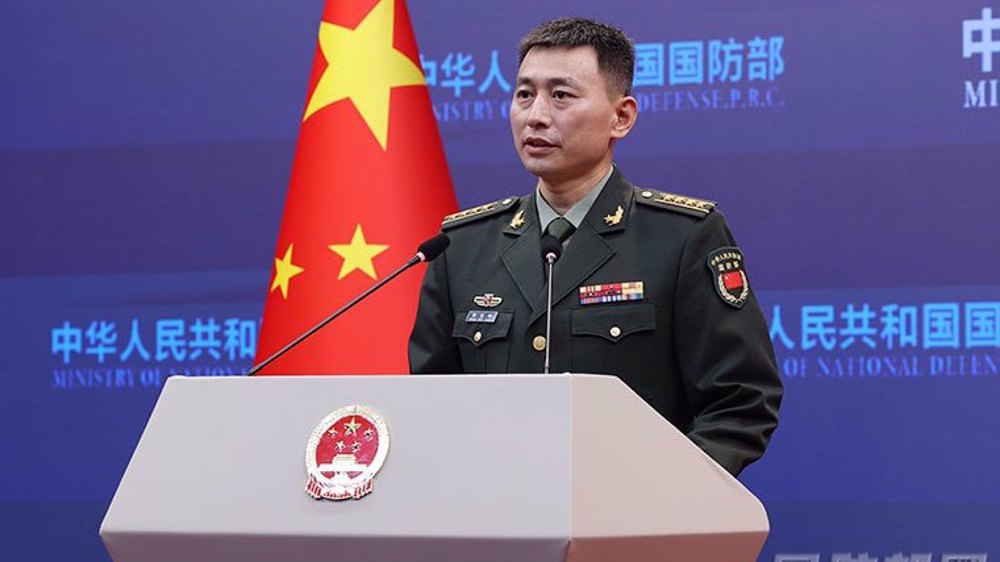China says US closure of consulate "severely harmed" Beijing's relations with Washington
China has warned that it will be forced to respond and take reciprocal measures after Washington ordered Beijing to shut its consulate in the Texan city of Houston over spying allegations, noting that the move has done severe damage to bilateral relations.
Chinese Foreign Ministry spokesman Wang Wenbin said the US move has "severely harmed" relations, describing the accusations as "malicious slander".
"In response to the US's unreasonable actions, China must make a necessary response and safeguard its legitimate rights," he said, adding, "This is tearing down the friendly bridge between the people of China and the US."
Wang also said China would safeguard its citizens in the United States.
"For some time, the US has held ideological bias to continuously surveil, harass and even arbitrarily detain Chinese students and scholars in the US," he said. "We urge the US to stop using any excuse to restrict, harass or oppress Chinese students and researchers in the US."
Chinese media editorials also strongly denounced the US order to shut the Houston consulate as a desperate attempt to blame Beijing for US failures ahead of the November presidential election.
Support for President Donald Trump’s response to the coronavirus crisis has plunged over the past month, with a majority of Americans now disapproving of his handling of the pandemic, according to several new polls.
The China Daily described the closure of the consulate as "a new gambit in the US administration's bid to paint China as a malevolent actor on the world stage, and thus make it an outlaw to the international community".
"The move shows that lagging behind his presidential election opponent in the polls ... the US leader is going all out in his attempts to portray China as an agent of evil," it said.
The South China Morning Post reported that China may close the US consulate in the southwestern city of Chengdu.
Some sources said China was considering shutting the US consulate in Wuhan, where the United States withdrew staff at the start of the coronavirus outbreak.
Hu Xijin, editor of the Global Times, an English-language Chinese newspaper, wrote that shutting the Wuhan consulate would be insufficiently disruptive.
Hu said the United States had a large consulate in Hong Kong and it was "too obvious that the consulate is an intelligence center".
"Even if China doesn't close it, it could instead cut its staff to one or two hundred. This will make Washington suffer much pain," he wrote.
The other US consulates in China are in Guangzhou, Shanghai and Shenyang.
Washington on Tuesday gave China 72 hours to close the consulate "to protect American intellectual property and Americans' private information".
The Chinese government immediately condemned the move and warned it would retaliate unless Washington rethought the decision
Relations between the United States and China have hit the lowest level in decades. The two are at loggerheads over a range of issues, including trade, Hong Kong, Taiwan, the South China Sea, and the coronavirus pandemic.
In all of those cases, Washington has been aggressively ramping up rhetoric against Beijing in recent weeks.
After a meeting in London with British Prime Minister Boris Johnson and UK Foreign Secretary Dominic Raab, US Secretary of State Mike Pompeo told reporters that China was bullying its neighbors and pushing its claims to maritime regions that he said it had no lawful claim to. Pompeo said he wanted to “build out a coalition that understands this threat.”
Pompeo has also said the United States would do everything it could to support China’s rivals in territorial disputes.
Last week, Chinese Foreign Ministry spokeswoman Hua Chunying said American officials had “gone mad” in dealing with China.
Israeli strikes on north Gaza hospital ‘extremely dangerous, terrifying’: Director
VIDEO | Yemen targets Tel Aviv with Palestine 2 missiles
Pezeshkian: Iran resolved to complete North-South Transport Corridor
VIDEO | Iran-Syria: For Resistance
Qassam Brigades claims killing 3 Israeli troops in northern Gaza
More alive than ever: Sayyed Hassan Nasrallah's legacy grows stronger in martyrdom
Occupation of Syria’s highest peak Mount Hermon part of ‘Greater Israel’ project
Iran: Syrian people will decide their future without foreign interference













 This makes it easy to access the Press TV website
This makes it easy to access the Press TV website